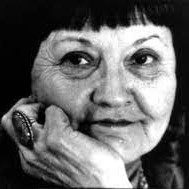The last wolf hurried toward me
through the ruined city
and I heard his baying echoes
down the steep smashed warrens
of Montgomery Street and past
the ruby-crowned highrises
left standing
their lighted elevators useless
Passing the flicking red and green
of traffic signals
baying his way eastward
in the mystery of his wild loping gait
closer the sounds in the deadly night
through clutter and rubble of quiet blocks
I hear his voice ascending the hill
and at last his low whine as he came
floor by empty floor to the room
where I sat
in my narrow bed looking west, waiting
I heard him snuffle at the door and
I watched
He trotted across the floor
he laid his long gray muzzle
on the spare white spread
and his eyes burned yellow
his small dotted eyebrows quivered
Yes, I said.
I know what they have done.
Published:
1990
Length:
Literary Movements:
Native American Renaissance
Anthology Years:
2023
Themes:
Nature
Poems of Place
Science & Climate
Literary Devices:
Dialogue
conversation between two or more people as a feature of a book, play, or movie
Imagery
visually descriptive or figurative language, especially in a literary work
Sensory Detail
words used to invoke the five senses (vision, hearing, taste, touch, smell)

